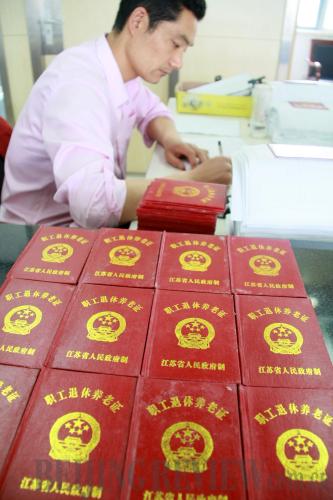|
 |
|
PENSION CERTIFICATION: An employee with the Social Pension Funds Management Center of Hai'an County, Jiangsu Province, works on pension documents on June 2, 2011 (XINHUA) |
The next steps
Despite the complete coverage, China's pension program will need to be perfected, Wang said. One of the main problems lies in the gap between pension standards for civil servants, public institution employees, enterprise employees and rural residents.
"The divide has become a bottleneck impeding job equality and talent flow in China," Wang said. "The pension programs will need to be unified to correct this."
Song Xiaowu, President of the China Society of Economic Reform, also said a unified pension scheme is needed. "All Chinese citizens, including farmers, deserve fair treatment after retirement, and a divide in pension benefits disobeys social fairness and justice," he said.
These pension standards are likely to grow in tandem with China's economy, Song said.
The individual accounts in China's pension programs are actually a kind of compulsory saving, Wang said, but if there is no reliable method of maintaining and increasing their savings' value, the deposits in the individual accounts may become a heavy burden given negative interest rates in real terms.
Currently, all personal contributions under the existing program are in bank accounts or invested in government bonds. It was estimated that the yield rate of the individual account capital was barely 2 percent in 2010 while the country's inflation rate stood at 3.3 percent last year.
"That means the deposits are actually losing value," Wang said. "As a result, vigorous efforts are still needed to further improve design and operation of the pension funds."
Li Zhen, a professor with the School of Public Administration and Policy of the Renmin University of China, said China's social welfare system reform is basically heading toward greater fairness, though it should play a bigger role in income distribution.
Li also raised a growing concern about China's weakening payment capacities of pension funds in the next 20-30 years.
The government raised the basic monthly pension for enterprise retirees for sixth consecutive years. But it still falls short of what is needed to make ends meet for ordinary households. Since 2003, the per-capita pension of enterprise employees has been less than the per-capita disposable income of urban residents—and the gap is widening. Retirees have also become the poorest demographic in China. If no system adjustment is made, many retirees will have to struggle with acute poverty in the future, Li said.
The Central Government has been well aware of these urgent circumstances. "Individuals, families and the society should also play a better role. Residents are also encouraged to make their own plans, such as purchase of commercial insurances," said Premier Wen Jiabao at a meeting on June 20.
"Meanwhile, families could do better to provide economic and emotional care for the seniors," Wen said. "Filial piety is one of the traditional virtues of the Chinese people."
In addition, the social charity should also lend a helping hand. All kinds of measures must be implemented to allow the aged citizens to spend their remaining years in comfort, Wen said. | 